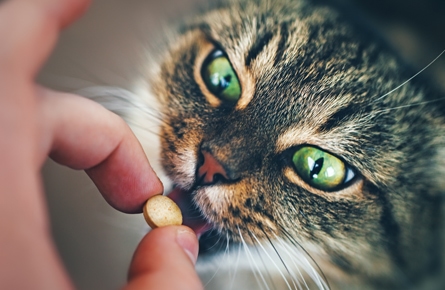Parasite control
We firmly believe in providing regular parasite control for your pet; worms, fleas, ticks and lice can endanger your pet’s health and well-being, in the case of kittens, for example, they can even be fatal. We provide advice and guidance on the best parasite control for your pet; please ask at reception for further information.
Prescription-only parasite control medicines are far more effective than treatments you can buy ‘over the counter’, and we do not recommend this type of treatment for your pet. If you need help applying parasite control medication, then our practice nurses would be pleased to assist you.
To determine the level of parasite treatment your pet needs, we will work with you to carry out a risk assessment based on your pet’s lifestyle and behaviour.
Book a flea and worm treatment appointment
Flea Treatments
Fleas commonly cause itchiness and annoyance to pets and their owners. Some animals can become allergic to flea saliva, and this can cause much more marked symptoms. Signs your pet may have fleas include excessive scratching, small scabs and spots on the skin and small brown specks in their fur, which is flea ‘dirt’ (excrement).
Fleas are often contracted from other animals, both wild and domestic, and the environment, the animals are housed in.
It is important to remember that only 5% of the fleas will be on your pet, 95% of fleas live in the local environment in the form of eggs, larvae and pupae. These live in your pet’s bedding, carpets, upholstery and any soft furnishings within your home. Therefore, it is equally important to treat your home by thoroughly vacuuming and using a household flea spray.
The use of a good flea treatment each month will prevent your dog or cat picking up fleas in the environment outside and bringing them into your home.
Worms
Almost all puppies and kittens are infected with roundworms as they are passed on from mother to baby. We recommend monthly worming from 8 weeks old until three months of age to combat this. After this period of time, a worming strategy needs to be put in place for the lifetime of your pet.
Roundworm eggs are found in the soil, they are moist and sticky and so are easily transferred into the house on people’s shoes, or animal’s fur. The eggs are swallowed as your pet grooms himself/herself, and the eggs hatch out into worms inside your pet. They can be passed on to humans, especially children, where serious infestations can cause severe symptoms, including blindness (toxocariasis).
Pets can also catch tapeworms by either eating fleas – which often contain tapeworm eggs – or by eating infected mice, birds, raw meat or faeces. Tapeworm segments look like flattened grains of rice. If you suspect a tapeworm problem is it also advisable to treat for fleas.
Toxocara is one species of tapeworm that can spread from animals to humans, rarely Toxocara can cause blindness in humans, and is also known to be dangerous for pregnant women.
Lungworm is picked up by eating slugs and snails, either intentionally, or in mouthfuls of grass or vegetation. Lungworm is becoming more common and can be potentially fatal if not diagnosed and treated. Symptoms may be mild but can include a severe cough and life-threatening clotting problems.
Please be aware that no worm control medication will prevent re-infestation, as they only kill worms already present in your pet. Therefore, it is important to treat your pet regularly, especially if they hunt or scavenge.
Book a flea and worm treatment appointment
Protecting Your Pet From Ticks
 Ticks are a common parasite that can affect pets, and at Barn Vets, we urge pet owners to be aware of the risks associated with tick bites and to take steps to prevent them.
Ticks are a common parasite that can affect pets, and at Barn Vets, we urge pet owners to be aware of the risks associated with tick bites and to take steps to prevent them.
Ticks can transmit diseases to pets, including Lyme disease. These diseases can cause serious health problems for pets, and in some cases, can even be fatal. Therefore, it is important to take preventative measures to protect your pets from tick bites.
Here are some tips for tick prevention in pets:
-
Use a tick preventative treatment - There are many different tick preventative products available, including spot-on treatments, collars, and oral medications. These treatments work by killing ticks before they have a chance to bite and can be a highly effective preventative measure.
-
Check your pet for ticks regularly - After spending time outside, be sure to thoroughly check your pet for ticks. Ticks can attach anywhere on the body, but are most commonly found around the head, ears, neck, and feet. If you find a tick, use tweezers to carefully remove it, making sure to get the entire tick and avoiding crushing it.
-
Keep your garden tidy - Ticks thrive in tall grass and other vegetation, so keeping your garden well-maintained and mowed can help to reduce the tick population.
-
Avoid walking in wooded or brushy areas - These are high-risk areas for ticks, and avoiding them can help reduce the risk of tick bites.
-
Talk to your vet - Your vet can provide guidance on tick preventative products and offer recommendations based on your pet's individual needs.
By following these tips and taking preventative measures, you can help protect your pets from the risks associated with tick bites. If you have any concerns or questions about tick prevention for your pet, be sure to call Barn Vets today.
Parasite Control: Hazards in our local community in Basingstoke
Fleas, worms and other parasites can be caught at parks local to The Barn Animal Practice.
Parks are a breeding ground for parasites, especially in the warmer months from April to October. As a pet owner, you do not want to deprive your beloved pet of the chance to make friends, and you certainly do not want to limit the opportunity to be outside. But, if it seems like all the other pets are itching, scratching and playing with slugs and other parasite carriers, what is a pet owner to do?
Spread the cost of essential healthcare for your pet

To spread the cost of routine worming and flea treatment for your pet, Barn Vets offer the Pet for Life Health plan, which includes parasite control for your pet.
More information about prevention for cats & dogs
Parasite prevention for cats Parasite prevention for dogs
Frequently Asked Questions:
What happens to my pet if they don't have flea and worm treatment?
When it comes to worm treatment, there may be severe consequences if ignored. Depending on the type of worm your pet can experience irritation such as intestinal blockages, obstruction of blood flow in the heart, artery inflammation, anaemia, and even death if left untreated.
Can you get combined flea and worm treatment for pets?
There are combined flea and worm treatments you can get for your pets, also known as an all-in-one flea and wormer. However, it's always best to consult your veterinary practice as these treatments don't cover some types of worms. Your pet may also have complications that combined treatments don't cover.
How often does my pet need flea and worm treatment?
Once every month, you should treat your pet for fleas, and every two to three months, or even more frequently, for worms. Depending on your pet's lifestyle, talk to your vet about the best course of action.
How long should I wait between worming and flea treatments?
Many people wonder if they can treat their cats for fleas and worms at the same time or how long they should leave between treatments. Depending on the two treatments being administered you may need to wait either 48 hours or two weeks between treatments. Please ask your vet when picking up your flea and worm treatment how to apply the two treatments most effectively and safely.
Do indoor cats need flea and worm treatment?
Every cat, even indoor cats, need regular flea and worm preventative treatments. It is a common misconception that an exclusively indoor cat does not need these treatments – this is not true at all. Fleas commonly travel on clothes and bags and so may be brought into the house at any time. A cat could even pick up fleas during a trip to a vet, especially where other pets may not have been treated.
What do vets use to deworm dogs?
There are many ranges of worming treatments that we can prescribe, including tablets, liquids, granules and spot-ons. The products can vary with the latest recommendations, we would advise contacting us to discuss our various products so we can give you the most appropriate recommendation. Flea treatment and worming regimes are not a one size fits all, so it's best to speak to us.
What is the best worming treatment for dogs?
There are many products available as well as new products emerging each year. We are here to help with selecting the best-suited protection for you and your dog. We have the most up to date advice and treatments available. We dispense prescription-only parasite treatments which are more effective than over the counter treatments and are often combined to tackle other parasites in one medication.
Under UK law, only veterinary surgeons can prescribe prescription medications as they are required to health assess a dog before prescribing them. For flea and worm treatments, vets usually require a health check every 12 months, which can fall under your pet's annual booster health check. Please note other classes of medications vary with the frequency of health checks required.
What do dogs do when they have worms?
Worms (excluding tapeworm) are rarely seen, so it is difficult to know if your dog does have worms. Therefore, prevention is much safer for your dog. Tapeworms can appear as rice-like grains around the anus or in faeces. It is essential that you give regular treatments, especially if you have children. Puppies are also at a higher risk of worms. Worms are zoonotic meaning they can pass from animals to people.
Symptoms usually occur in high levels of infestation – these symptoms include:
- diarrhoea
- vomiting
- swollen abdomen
- lethargy
- nutritional deficiencies
- dehydration
- cough (in roundworm and hookworm infections)
- pneumonia (in serious cases of roundworm).
If you would like to discuss a worming treatment plan with our vet, you can contact us, and we can provide the most up to date and evidence-based recommendations.






